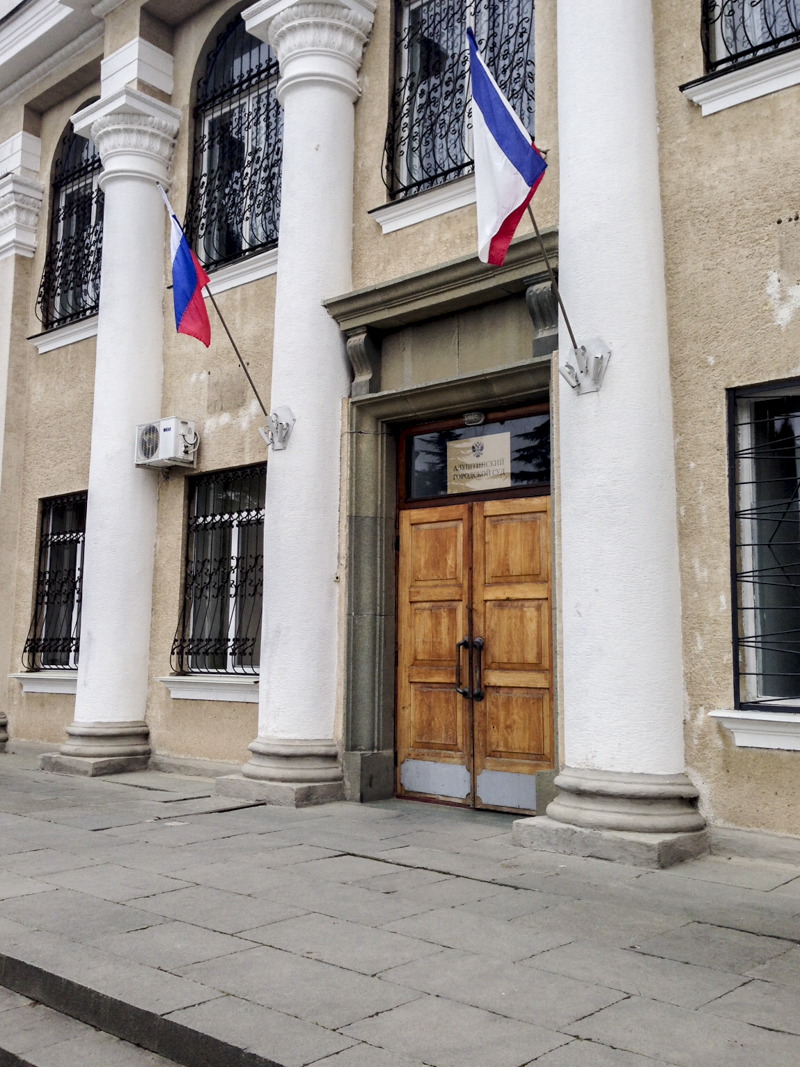
Dispatch from Crimea
[vc_row row_type=”row” use_row_as_full_screen_section=”no” type=”full_width” text_align=”left” css_animation=””][vc_column][vc_column_text]
Dispatch from Crimea: Our Ukrainian correspondent heads to Crimea to report what the situation is actually like, since the Russian invasion.
No Flights
With no direct flights between Kyiv (Kiev in English) and Simferopol (capital of Crimea), the only possibility is to fly from Ukraine to Moscow and then fly to Crimea. With tickets for this journey being twice the price of a regular flight, we take the train. The train from Kiev used to take 13-15 hours to arrive to Crimea, since the Russian invasion this trip takes much longer.
New Borders
Crossing from Ukraine to Crimea now entails going through border crossings. The first border crossing is in a small city called Melitopol in the Kherson region; here Ukrainian border guards check the documents of every traveller. We go through a similar procedure in Dzhankoy, on the Crimean side of the border, where Russian border guards check our documents (mine shows I am registered in the West, a place in Ukraine where Putin says radicals live), they ask the purpose of our visit. We are here as a lawyers, this, as it turns out, was satisfactory for the guard and he allowed us to continue our journey. However, I was required to fill in a migration card – basically a visa. In each border we spent over an hour going through these checks.
Soldiers on the ground
When we arrived in Simferopol’s railway station, the sight of “self-defence” soldiers greeted us. They were wearing military uniforms with Russian flags on their sleeves. It’s obvious they are not regular army, they are here to maintain law and order, and have the right to check your luggage and documents. Their presence causes more fear than a feeling of security.
Business not as usual
On our way out of the station we see a McDonalds, no longer open, with a sign on the door saying they are closed for “technical reasons.” We know the real reason, with the lack of stability here McDonalds does not want to take the risk of operating: offering staff in their Crimean stores, similar positions with the same salary in different locations within Ukraine – a great way to help their employees escape the instability.
Crimea still crumbling
After leaving the railway station it becomes clear, Crimea has not changed a great deal since the invasion. It is still the same poor, underdeveloped region with crumbling infrastructure surrounded by beautiful nature. The main difference is in the mentality of the people, they now want to discuss politics.
Tatar’s disenfranchised
We caught a taxi from Simferopol to the coastal town of Alushta. The driver was a Tatar (a local muslim ethnicity, of which there is 300,000 in Crimea), and he was happy to speak with me, as I am from “Ukraine.’’ He said Tatars are against the Russian occupation, and are the most disenfranchised community in Crimea. Their leader was recently kicked out of Crimea and forbidden to return. Tartars are apparently ready to fight against Russia, yet do not have weapons or the support. They wait in hope that the international community will assist in returning Crimea to Ukrainian control.
Russian law
The reason for our journey to Alushta was for a court hearing. In the court there was a Russian flag, in the place of what once was a Ukrainian one. The courts now use the Russian language and legislation. Even for partly considered cases in Ukrainian law, there was no “transition period” and they are now judged through Russian law. There are rumours that local judges and other state officers were required to change from their Ukrainian nationality to Russian in order to keep their jobs.
Bad banking
Most Ukrainian banks have stopped operating in Crimea. Visa, MasterCard and bankcards do not work there. The only banks we saw in operation were Russian, with huge lines running out of their front doors. All businesses in Crimea now officially sell goods in rubles (Russian currency) but some sellers will accept hryvnia (Ukrainian currency) as we found in Alushta.
Nuevo tourist
We met some Russian tourists from Sakhalin (a far eastern region in Russia, close to Japan). They flew 9 hours to Moscow and 3 ½ to Crimea to see this newly formed region. Their belief is Crimea was always Russian and they are happy to know it belongs to their “motherland” again. They have not seen Crimea for twenty years and are disappointed to find Alushta – a beach-side tourist-town – looking like a typical, run-down, Soviet Union village. It’s not a very inspiring place.
Tourist season
The Russian govt has started a huge campaign to persuade Russians to spend their summer holidays in Crimea. Flights are now cheap to fly from Moscow – only $250 US, return. The couple from Sakhalin are some of the first Russian tourists to arrive. Locals are expecting many more to follow – from what we saw, it does not look like they will come.
Russia in control
From what we saw, life in Crimea, in comparison to other regions in eastern Ukraine, is calm. We saw many military vehicles, but rather than engaging in any serious activities they were just driving from point to point. The Ukrainian military has completely left Crimea and is not making any efforts to return.
Locals are making preparations for the summer season and wait in hope of many Russians coming to spend their rubles in these once popular tourist towns.
With so much attention now focused on Donetsk, Lugansk and other Eastern parts of Ukraine, where Russian backed forces are destabilising the region. Crimea finds itself out of the news, to pick up the pieces in isolation. With Russia in control.
Oleksandr Ruzhytskyi is a FLINT correspondent, based in Kiev, Ukraine.
[/vc_column_text][/vc_column][/vc_row]















